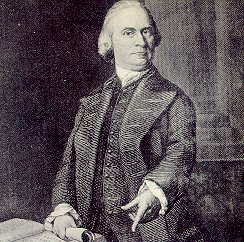
< Previous Page * Next Page >
At this juncture, the British Board of Trade, which had been hearing reports of deteriorating relations with the Indians, ordered the governor of New York and commissioners from the other colonies to call a meeting of the Iroquois chiefs to frame a joint treaty. To this end, in June 1754, representatives of New York, Pennsylvania, Maryland, and the New England colonies met the Iroquois at Albany. The Indians aired their grievances, and the delegates framed a report acknowledging them and recommending appropriate action.
But the Congress transcended its original purpose of solving Indian problems. For it declared a union of the several American colonies "absolutely necessary for their preservation," and the colonial representatives present adopted the Albany Plan of Union which Benjamin Franklin had drafted. It provided that a president appointed by the King act with a grand council of delegates chosen by the assemblies, each colony to be represented in proportion to its financial contributions to the general treasury. The government was to have charge of all British interests in the west-Indian treaties, trade, defense, and settlement. But none of the colonies accepted Franklin's plan, for none wished to surrender to an outside body either the power of taxation or control over the development of the west.
On the part of the colonies, there was little systematic or energetic support for the war as a whole, all schemes failing to bring them "to a sense of their duty to the King." And even such help as individual colonies offered was marred because of the lack of a larger motive. The colonists could see the war only as a struggle for empire on the part of England and France. They felt no compunction when the British government was obliged to send large numbers of regular troops to wage colonial battles. Nor did they regret that the "red-coats," rather than provincial troops, won the war. Neither did they see any reason for not carrying on trade which, in effect, constituted "trade with the enemy." In spite of this lack of wholehearted colonial support and several early military defeats, England's superior strategic position and her competent leadership ultimately brought complete victory. After eight years of conflict, Canada and the upper Mississippi Valley were finally conquered, and the dream of a French empire in North America faded.
 |
| Firebrand of the American Revolution, Samuel Adams devoted his life to an impassioned, never-flagging appeal for separation from England |
< Previous Page * Next Page >